




This phrase was gifted by Ngāi Tūāhuriri to encompass the work that we do for our people.
Dr Te Maire Tau, Ngāi Tūāhuriri Upoko, Ngāi Tahu Historian and Director of the Ngāi Tahu Research Centre at the University of Canterbury drew on the philosophy laid down by Ngāi Tūāhuriri Upoko, Pita Te Hori who said in 1861:

Kia atawhai ki te tangata - Care for the people and gifted this statement to Pegasus Health.Jane Huria
“PEGASUS
POPULATION
STRATEGY
E ngā mana, e ngā reo, e ngā whānau whānui o tēnei rohe o Waitaha. Tēnei te mihi maioha ki a koutou katoa mai i ngā hau e whā. Nā Te Rūnanga o Tūāhuriri i tākoha mai te kīanga “Kia atawhai ki te tangata” he hononga tēnei ki te kaitiakitanga o ngā tāngata katoa e noho ana i te takiwā o tēnei rohe.
Nau mai, tauti mai ki tēnei mahere rautaki, ‘Kia atawhai ki te tangata’.

Welcome to Pegasus Health’s Equity & Population Health Strategy | Kia atawhai ki te tangata 2022-2030.
Our purpose is ‘that all people living in Waitaha Canterbury lead healthy lives’, and our role is ‘together making Waitaha Canterbury the best place to receive and provide primary care’.
Our population health statistics show that, nationally and regionally, we are failing to deliver equitable health outcomes for Māori, Pacific, our culturally and linguistically diverse populations, people with disabilities, those who experience serious mental illness, and rainbow peoples.
It is not acceptable for us to continue to operate within a system with health inequities. We must find new and better ways of doing things; ways of working that enable us to truly achieve our purpose and fufill our role.
The solutions to address these inequities will not come from us, but are found through working within our communities and respecting the principle of Tino Rangatiratanga. By working with our priority communities, we can make changes that will have a lasting and positive impact on their health, well-being, and health equity.
This strategy is the foundation upon which we will develop a population health approach to improve the health of all people living in Canterbury, underpinned by a focus on improving the health of Māori and other priority groups.
I want to acknowledge the Pegasus Health (Charitable) Ltd Board, Clinical Quality and Population Health Advisory Boards, and Canterbury Reference Groups, for their input and support in developing this strategy, and continued commitment to health equity. I also acknowledge the Pegasus Health staff, our partnership organisations, and the general practice and pharmacy teams, as Pegasus Health would not be able to undertake this essential mahi without them. Most importantly, I acknowledge the people, whānau, and communities we serve.

We all have a responsibility to work towards health equity. Pegasus Health looks forward to working with you on this very important mahi.
He mihi maioha,
Nā Mark Liddle Manukura | Chief Executive Officer
In Aotearoa and Waitaha Canterbury, Māori and Pacific peoples disproportionately experience health inequities. Health inequities are linked to: living with a disability; mental health and addiction issues; living in low socio-economic backgrounds; being culturally or linguistically diverse (CALD); and those who identify as being sexually or gender diverse (LGBTQI+). This Equity & Population Health Strategy frames Pegasus Health's commitment to equity through a population health approach.
In September 2020, the Pegasus Health Equity Strategy | Kia atawhai ki te tangata 2020-2030 was endorsed by the Pegasus Health (Charitable) Ltd Board. The strategy demonstrates Pegasus Health's commitment to prioritising equity for the organisation and across Waitaha Canterbury.
In 2022, we decided to evolve the strategy to reflect its population health approach, to achieve health equity and incorporate monitoring and accountability to achieve equitable health outcomes.
The Pegasus Health Equity & Population Health Strategy | Kia atawhai ki te tangata 2022-2030 strengthens our commitment to achieve health equity by overtly, purposefully and strategically threading equity and Te Tiriti o Waitangi throughout our organisation, the wider primary healthcare network and how we operate.
The updated strategy is a response to the 2020 New Zealand Health and Disability System Review1, which recommended system-level changes to the health system to achieve better and more equitable health and well-being outcomes for all New Zealanders. The four principles of the health system reforms are:
» People-centred: a system that brings together the voice of all communities
» Equitable: a system that focuses on working in partnership with Māori and honouring Te Tiriti o Waitangi
» Accessible: a system that offers more equitable, convenient and integrated access to services for all New Zealanders
» Cohesive: a national health system that delivers locally, supported by coordinated planning and oversight.
By prioritising health equity and population health in our considerations, structures, decisions and processes, we can improve the health outcomes of all people in Waitaha Canterbury.
Our Equity & Population Health Strategy is centred around its Call to Action (page 8), based on four equity pou or pillars. Under each pou are a range of key principles that Pegasus Health is activating to improve health equity:
» He Tirohanga Whānui | Our Strategic focus embeds equity considerations in all aspects of our strategic approach
» He Mahi | Our Way of Working ensures equity is reflected in all that we do
» Kotahitanga | Collaboration facilitates working together to improve health access and outcomes
» He Tāngata | Our People diversifies and develops our workforce to reflect the community.
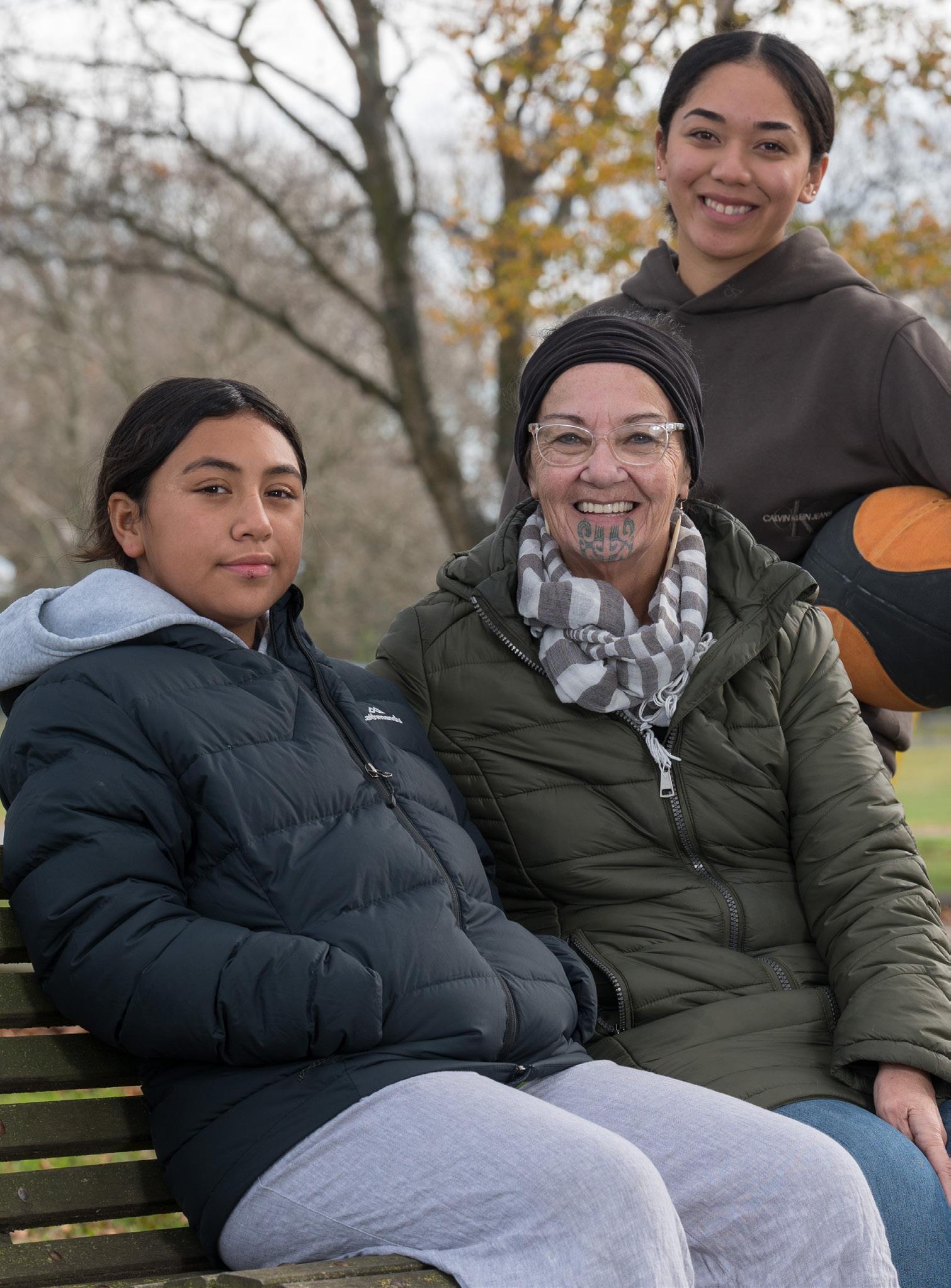 PEGASUS HEALTH EQUITY & POPULATION HEALTH STRATEGY
PEGASUS HEALTH EQUITY & POPULATION HEALTH STRATEGY
Through this Call-to-Action, Pegasus Health will centre activities where they will have the greatest impact, with a focus on achieving:
» Equitable outcomes across priority outcome areas

» Equitable access and outcomes across primary and community care services, and over time, expanding this focus to encompass equitable access to secondary care and social services.
Embed equity across our strategic approach
Embed Te Tiriti o Waitangi and equity considerations throughout all key documents
Develop, implement and monitor our Māori Health Plan
Set equity targets across the organisation that are resourced and reported

Ensure equity is a focus for all people and parts of the organisation.
KIA ATAWHAI KI TE
2022-2030
Ensure equity is reflected in all that we do
Use data and information to monitor, report and inform our equity approach
Prioritise providers, programmes and services that are pro-equity
Support a people-centred approach in primary and community care

Advocate for equity of health outcomes both locally and nationally
Develop and celebrate best practice for improving equity.
Work together to increase equitable health access and outcomes
Work with practices to ensure they provide equitable and accessible primary care
Support a more cohesive, connected and integrated health system

Prioritise our reference groups and advisory boards at every appropriate opportunity
Use a co-design approach to develop more responsive health services for priority communities
Establish and maintain meaningful relationships and partnerships with key communities including Mana Whenua.
Diversify and develop our workforce to reflect the community
Implement the Pegasus Health Diversity of Workforce Plan

Incorporate cultural safety and equity in professional development
Weave understandings of Te Ao Māori and Tikanga Māori into the organisation at all levels
Support and develop leaders and leadership opportunities
Strengthen relationships with Māori, Pacific peoples and other priority populations to be an employer of choice.
PEGASUS HEALTH
Pegasus Health's strategic approach to equity and population health is affirmed by Te Tiriti o Waitangi2, the founding document of Aotearoa.
Article III, Ōritetanga, specifies that Māori have the same “rights and duties of citizenship as the people of England"3. Manatū Hauora derives five principles from Te Tiriti o Waitangi for the primary care system: equity, active protection, options, partnership and Tino Rangatiratanga.
Equity requires the Crown to commit to achieving equitable health outcomes for Māori
Active protection requires the Crown to act, to the fullest extent practicable, to achieve equitable health outcomes for Māori
Options require the Crown to provide for and properly resource kaupapa Māori health services and to ensure that all health services are provided in a culturally appropriate way that recognises and supports Hauora Māori models of care
Partnership requires the Crown and Māori to work in partnership in the governance, design, delivery and monitoring of health services, including Māori being co-designers in the primary health system for Māori
Tino rangatiratanga requires Māori mana motuhake (self-determination) in the design, delivery and monitoring of health services.
Pegasus Health recognises that Māori rights to health equity are protected through Te Tiriti o Waitangi and it is the duty of the health sector as a whole to uphold these rights. The Pegasus Health Equity & Population Health Strategy highlights our commitment to upholding our Te Tiriti o Waitangi obligations.
The updated He Korowai Oranga: New Zealand Māori Health Strategy 4 sets the overarching framework that guides the Government and the health and disability sector to achieve the best health outcomes for Māori.
2 health.govt.nz/our-work/populations/maori-health/te-tiriti-o-waitangi 3 teara.govt.nz/en/document/4216/the-three-articles-of-the-treaty-of-waitangi 4 health.govt.nz/our-work/populations/maori-health/he-korowai-oranga
PEGASUS HEALTH EQUITY & POPULATION HEALTH STRATEGY | KIA ATAWHAI KI TE TANGATA 2022-2030He Korowai Oranga is reflected in the Canterbury Māori Health Framework, Kia whakakotahi te hoe o te waka. The Framework is a commitment by Te Whatu Ora Waitaha and Primary Health Organisations (PHOs) in Canterbury to better achieve health equity for Māori.
The vision of He Korowai Oranga is reflected in Te Tiriti o Waitangi Framework5, which lays the foundation for the Health and Disability System Review.
Whakamaua is the Māori Health Action Plan for 2020-20256 to implement He Korowai Oranga: New Zealand’s Māori Health Strategy. Whakamaua has four high-level outcomes that respond to important cultural, social, economic and population health challenges present in Aotearoa:
» Iwi, hapū, whānau and Māori communities exercising their authority to improve their health and well-being
» Ensuring the health and disability system is fair and sustainable and delivers more equitable outcomes for Māori
» Addressing racism and discrimination in all its forms
» Protecting Mātauranga Māori throughout the health and disability system.
5 cdhb.health.nz/about-us/structure-divisions-and-departments/maori-pacific-health/ 6 health.govt.nz/publication/whakamaua-maori-health-action-plan-2020-2025
PEGASUS HEALTH EQUITY & POPULATION HEALTH STRATEGY | KIA ATAWHAI KI TE TANGATA 2022-2030health.govt.nz/system/files/documents/pages/whakamaua-tiriti-o-waitangi-framework-a3-aug20.pdf

PEGASUS HEALTH EQUITY & POPULATION HEALTH STRATEGY | KIA ATAWHAI KI
Our Equity Challenge: Papaki kau ana ngā tai o mihi oranga ki a koutou, Te Kāhui o Papaki Kā Tai recognises the urgency for making improvements to outcomes for Māori whānau living in Waitaha Canterbury. The principles of Te Tiriti o Waitangi provide the framework for how we will meet our obligations under Te Tiriti o Waitangi in our day-to-day work. Te Kāhui o Papaki Kā Tai recognises Mātauranga
Māori as the basis for principles to be embedded throughout primary care systems and services.
We are committed to child and maternal well-being to ensure more equitable outcomes for the next generation of Māori tamariki. The long talked about move to give more emphasis to preventive-care and the promotion of wellness needs to become a reality. This would require integration of services and systems and reduced dependence on models that focus on throughput and the general population.
Chair, Te Kāhui o Papaki Kā Tai

Karaitiana Tickell
The Pegasus Health Equity & Population Health Strategy incorporates national and regional priorities, to help activate them locally. Te Whatu Ora | Health New Zealand has signalled potential outcome areas that could be improved through a localities-based approach including:
» People with complex long-term conditions
» Whānau with complex health and social needs
» First 2,000 days
» People accessing mental health support
» Last years of life.
Through this approach, we will improve health equity, reduce barriers to healthcare and improve population health outcomes for people living in Waitaha, Canterbury and its localities by:
» Translating Te Whatu Ora strategies (New Zealand Health Strategy; Hauora Māori Strategy; Pacific Health Strategy; Health of Disabled People Strategy; Women’s Health Strategy and Rural Health Strategy) into action that delivers real improvements for our communities
» Where national strategies do not exist, develop and implement local strategies that recognise and respond to unique local needs.
PEGASUS HEALTH EQUITY & POPULATION HEALTH STRATEGY | KIA ATAWHAIThe Aotearoa definition of equity from the Manatū Hauora | Ministry of Health9 aligns with Te Tiriti o Waitangi obligations, beyond just reducing disadvantage, to enable Māori to flourish and lead their aspirations of health. This definition is also broad enough to incorporate all possible dimensions of equity (indigenous, cultural, socio-economic, disability, geographic).
“In Aotearoa, people have differences in health that are not only avoidable but unfair and unjust.
Equity recognises different people with different levels of advantage require different approaches and resources to get equitable health outcomes.”
The World Health Organization10 defines equity as:
"The absence of unfair, avoidable or remediable differences among groups of people, whether those groups are defined socially, economically, demographically, or geographically or by other dimensions of inequality (e.g., sex, gender, ethnicity, disability, or sexual orientation).
Health is a fundamental human right. Health equity is achieved when everyone can attain their full potential for health and well-being. Health and health equity are determined by the conditions in which people are born, grow, live, work, play and age, as well as biological determinants."
These concepts of health equity acknowledge that not only are differences in health status unfair and unjust, but they are also the result of varying levels of access to the resources necessary for people to lead healthy lives.
health.govt.nz/about-ministry/what-we-do/work-programme-2019-20/achieving-equity
who.int/ health-topics/health-equity
Population health aims to prevent illness and improve the health and well-being of whole communities, by holistically considering health, including physical, mental and emotional well-being, as well as social aspects, including education, employment and housing.
The King's Fund, UK11 defines population health as:
"An approach aimed at improving the health of an entire population. It is about improving the physical and mental health outcomes and well-being of people within and across a defined local, regional or national population, while reducing health inequalities. It includes action to reduce the occurrence of ill health, action to deliver appropriate health and care services and action on the wider determinants of health. It requires working with communities and partner agencies."
The New Zealand Health and Disability System Review12 identifies population health as the driver of the reformed health system. To improve equity of health outcomes, the needs of local communities are to drive the way the system decides what and how services are delivered, with resources that must be directed to areas of greatest need. The health of populations is:
"Shaped by the social, economic, cultural and environmental contexts in which people live, learn, work and play. Non-communicable diseases are the leading cause of health loss and health inequity in Aotearoa, yet many associated risk factors (such as obesity, poor diet, harmful alcohol consumption, physical inactivity, and tobacco use) are largely preventable. The burden of these challenges often falls most heavily on those who face disadvantage and experience discrimination."
kingsfund.org.uk/publications/what-does-improving-population-health-mean
https://systemreview.health.govt.nz/final-report/
The Population Health Advisory Board (PHAB) is made up of a range of individuals who all have a common goal: achievement of equity outcomes for the populations of Waitaha Canterbury. The Equity & Population Health Strategy is a key step forward for Pegasus Health to achieve this goal and we value our role of monitoring and feeding into this strategy. This can really make a difference to the lives of people in this region.
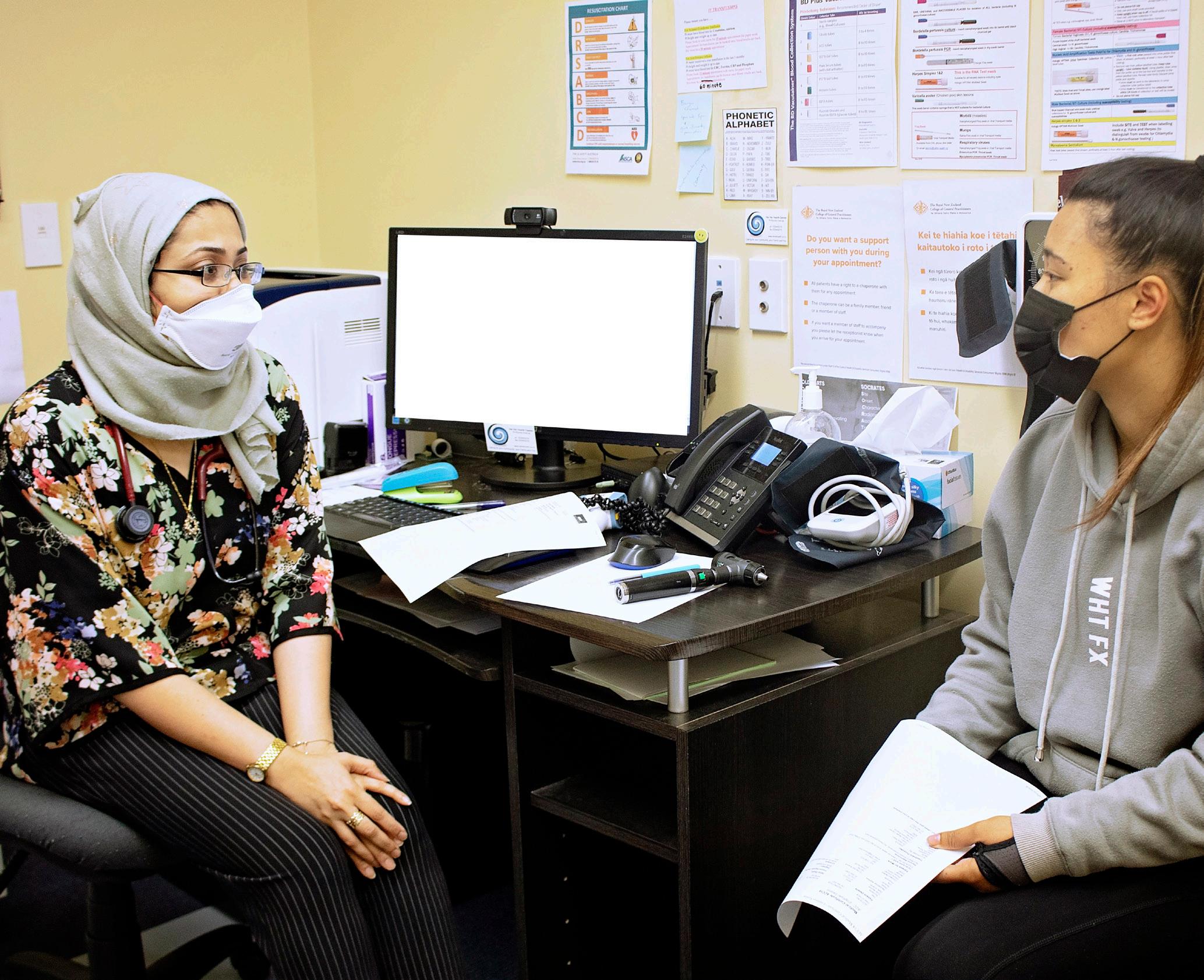
Sandy Brinsdon Chair, Population Health Advisory Board (PHAB)
Equity and population health are strongly connected. A population health approach is viewed as the most effective means of working towards equity.
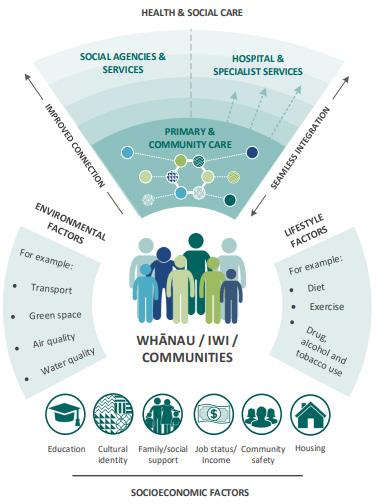
The Health and Disability System Review has an explicit focus on equity using a population health approach in restructuring the health system to better meet the needs of all New Zealanders. The Review calls for population health improvement to become the driver of all health system planning. Without successful population health strategies, individual treatment services will fail to achieve equity or significant improvements in the overall health and well-being of New Zealanders.
Inherent in any population health approach is an explicit focus on equity. Working to eliminate systematic inequities in health outcomes requires:
» Looking at which groups are most impacted
Understanding how and where inequities are evident
» Recognising upstream factors (the social, economic and commercial determinants that underpin health inequity)
» Implementing comprehensive strategies to eliminate or ameliorate upstream factors
An intelligent, equity-driven and data-informed health and disability system.
For a population health approach to drive the System, all key population health functions need to be embedded to ensure Pegasus Health is well-positioned to both protect the population and deliver improved and equitable health outcomes14.
The wider social and economic determinants of health are inextricably linked to effective health care (see The Population Health System diagram15). Pegasus Health can be most effective improving equitable health outcomes if the determinants of health are part of the wider picture. This includes advocacy and partnerships to support improvements in health determinants.
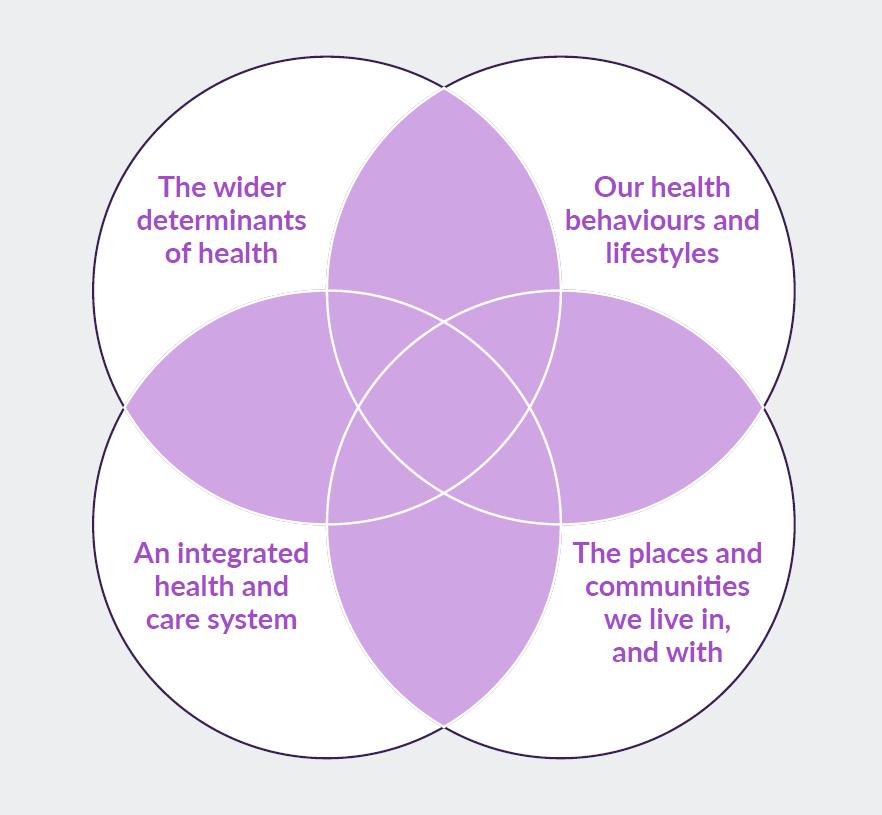
Equity is seen as tackling the gap in access and outcomes between New Zealanders, particularly for Māori, Pacific peoples, disabled people, and vulnerable groups. Health equity can only be achieved by eliminating health disparities, overcoming barriers to healthcare, and focusing on different approaches to meet the diverse range of health needs. 14 https://systemreview.health.govt.nz/final-report/ 15 kingsfund.org.uk/publications/what-does-improving-population-health-mean
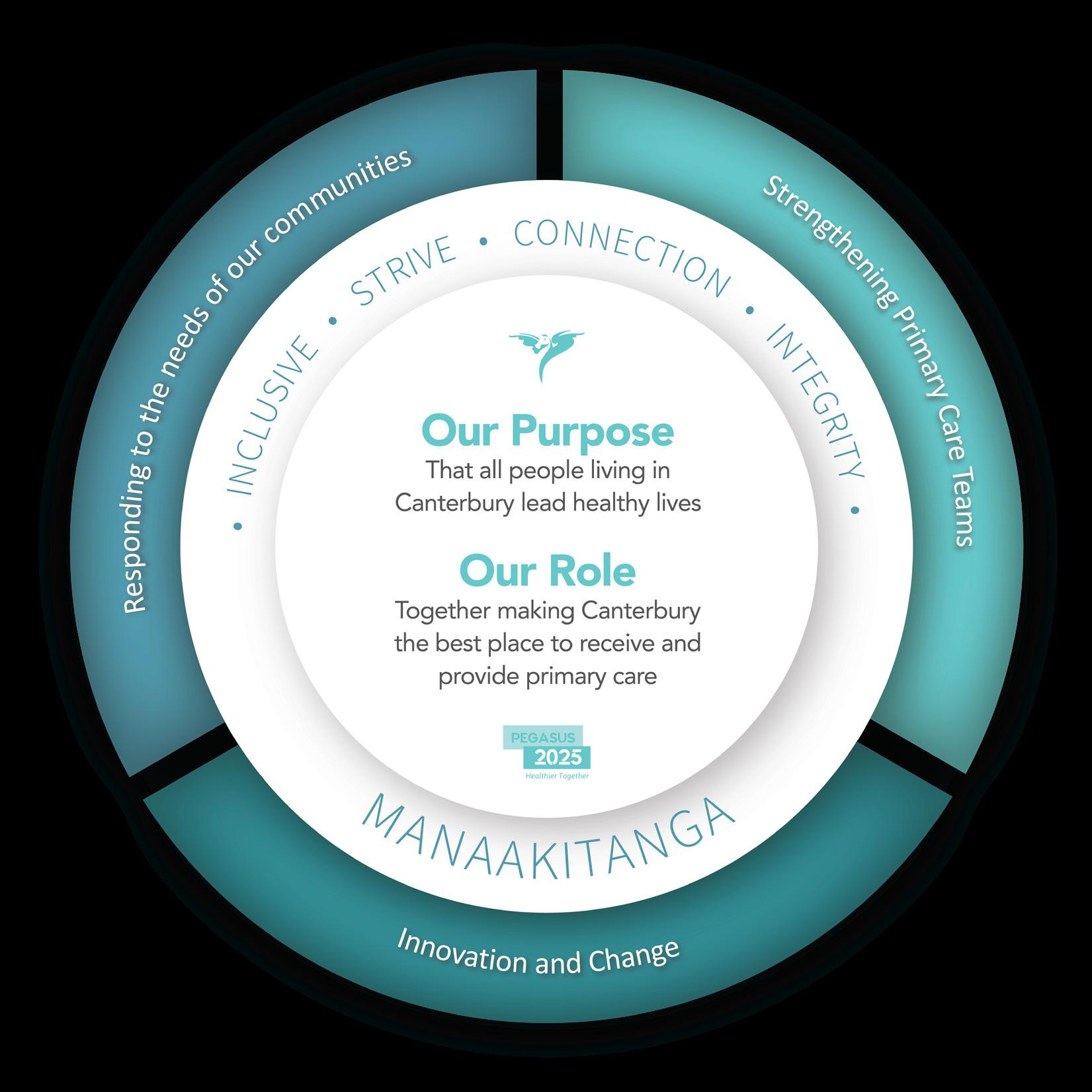
At Pegasus Health, our purpose is that all people living in Canterbury lead healthy lives. Our role is together making Waitaha Canterbury the best place to receive and provide primary care.
Our Pegasus Health values require that:
» We are inclusive – every voice is important to us
» We strive – for better everyday
» We connect – together we succeed
» We act with integrity – doing what is right.
Our values are underpinned by the guiding principle of manaakitanga, demonstrating kindness, generosity and care for others. Together, Pegasus Health values and manaakitanga create our ‘way of being’ as an organisation.
We are committed to improving the health outcomes for the people of Waitaha Canterbury through strengthening Primary Care Teams; innovations and change; and responding to the needs of our communities.
PEGASUS HEALTH EQUITY & POPULATION HEALTH STRATEGY | KIA ATAWHAIOur Equity & Population Health Strategy is aligned with the Pegasus Health Charitable Objectives16, particularly with a focus on:
» The reduction of disparities between the health of Māori and other identified groups within the population of Waitaha Canterbury and the reduction of barriers to timely access to appropriate health services
» The greater participation of the population of Waitaha Canterbury in health-related issues through proactive consultation and communication with communities and in keeping with the spirit of Te tiriti o Waitangi
» The improvement of integration and liaison between healthcare providers and others in Waitaha Canterbury to ensure that health care services are coordinated around the needs of its population.
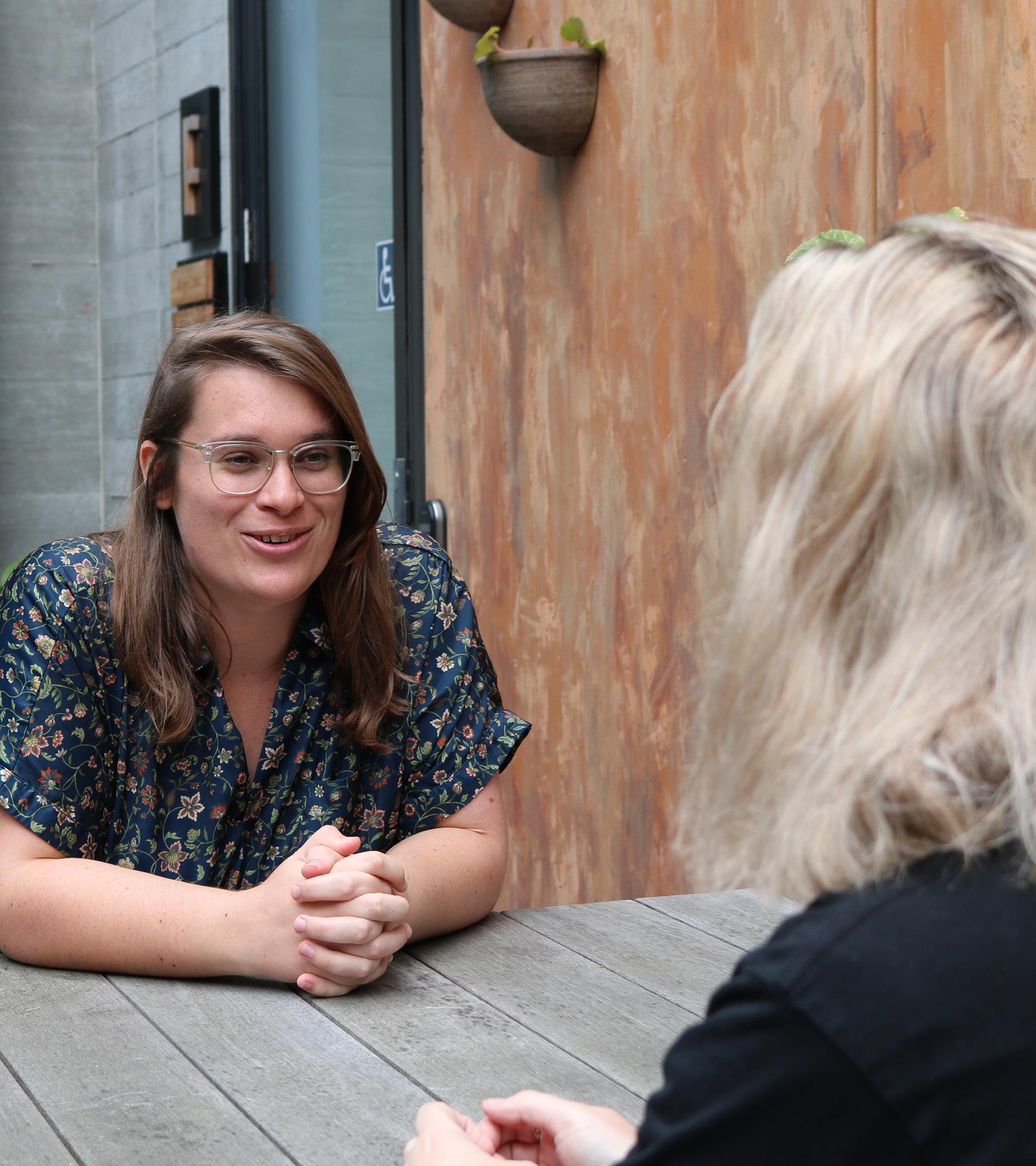 16 Pegasus Health (Charitable) Ltd Purpose and Charitable Objects
PEGASUS HEALTH EQUITY & POPULATION HEALTH STRATEGY | KIA ATAWHAI KI TE TANGATA 2022-2030
16 Pegasus Health (Charitable) Ltd Purpose and Charitable Objects
PEGASUS HEALTH EQUITY & POPULATION HEALTH STRATEGY | KIA ATAWHAI KI TE TANGATA 2022-2030
Pegasus Health is the largest PHO in Waitaha Canterbury. As of September 2022, Pegasus Health has 476,115 enrolled patients, 84% of the primary care enrolments in Waitaha Canterbury.
Of our enrolled population, 9.2% identified as Māori, 2.8% as Pacific, 11.2% as Asian, 1.5% as Middle Eastern, Latin American and African (MELAA), 74.2% as New Zealand European and 1.1% Other. There are some important differences in our enrolled population, reflecting national population differences.
Pegasus Health enrolled Māori, Pacific, Asian and MELAA populations are significantly younger than the NZ European population. In particular, more Māori and Pacific peoples are aged under 14 years.

These age differences mean that over time a growing proportion of our enrolled population will be Māori and Pacific peoples.
Deprivation and hardship are disproportionately experienced. There are twice as many enrolled Māori and three times as many Pacific peoples living in the most deprived quintile 5 compared to NZ European.
 PEGASUS HEALTH EQUITY & POPULATION HEALTH STRATEGY | KIA ATAWHAI
PEGASUS HEALTH EQUITY & POPULATION HEALTH STRATEGY | KIA ATAWHAI
Pegasus Health is an essential part of the Waitaha Canterbury Health System, supporting general practices and pharmacies, delivering community health services, and coordinating and linking parts of the system together to deliver quality healthcare and improve health equity.
As of September 2022, Pegasus Health has 94 general practices and 140 pharmacies belonging to our Primary Care Network. We also deliver a range of services to improve the health and well-being of patients in the wider Waitaha Canterbury community, including 24 Hour Surgery, primary mental health services, healthy lifestyle services, and services for new migrants and former refugees. We also provide health navigation services to increase equity of access to health services.
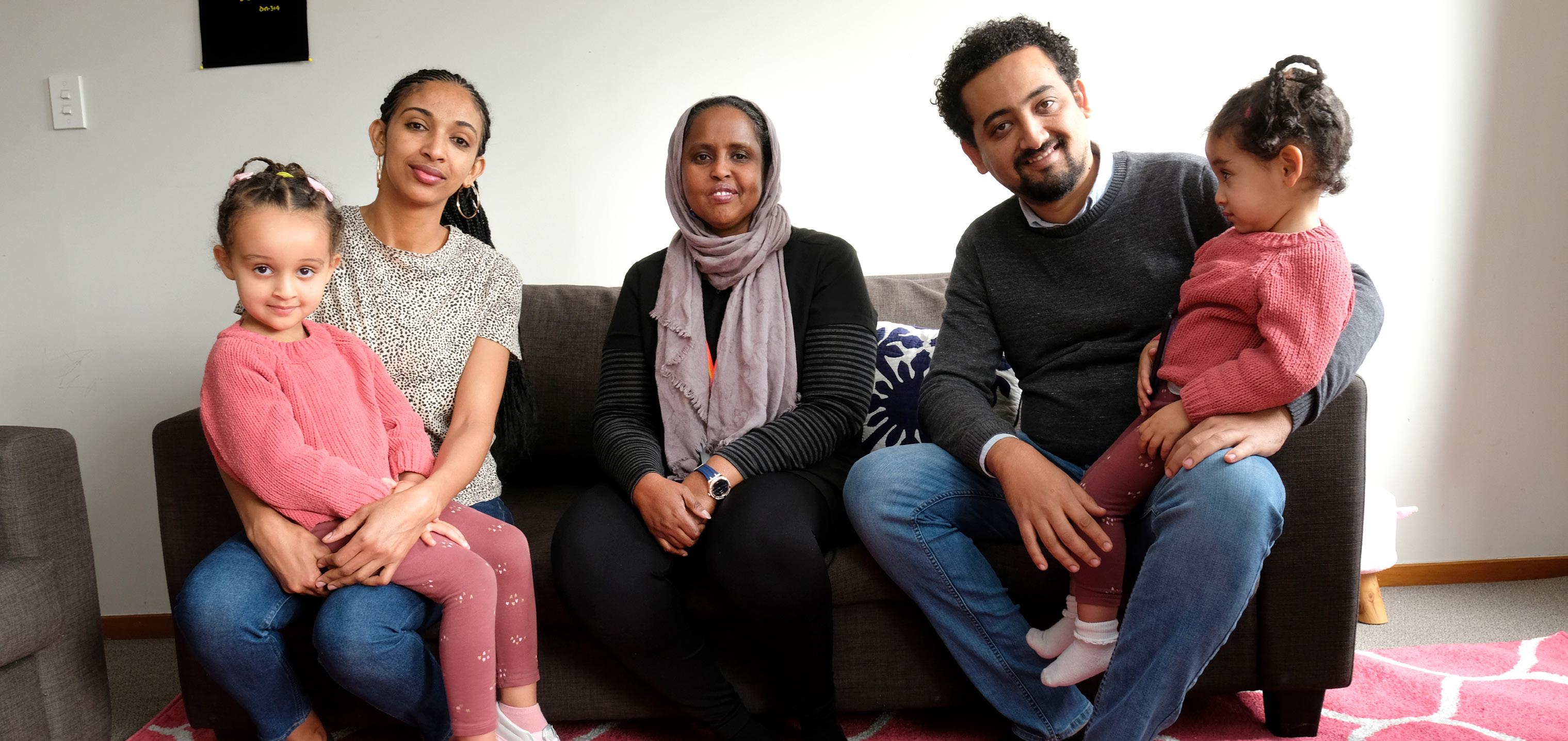 PEGASUS HEALTH EQUITY & POPULATION HEALTH STRATEGY | KIA ATAWHAI KI TE TANGATA
PEGASUS HEALTH EQUITY & POPULATION HEALTH STRATEGY | KIA ATAWHAI KI TE TANGATA
Pegasus Health’s equity focus is on our priority populations: our Māori, Pacific peoples, Culturally & Linguistically Diverse (CALD)17 and Rainbow people18. Pegasus Health has developed a range of plans and services to support our equity focus, including:
» The Pegasus Health Māori Action Plan delivers He Korowai Oranga through Whakamaua and the Canterbury Māori Health Framework (in redevelopment)
» The Pegasus Health Pacific Health Plan delivers the Canterbury Pacific Health Framework (in redevelopment).
» The Canterbury Culturally & Linguistically Diverse Responsiveness Framework guides our work to improve access to health services and health outcomes for CALD communities
» Pegasus Health supports the Canterbury Transgender Health Working Group, a community clinical group advising primary care and the Waitaha Canterbury health system to improve access to gender-affirming healthcare for transgender and non-binary people
» The Primary Mental Health Service aims to improve the mental health and well-being of our enrolled population through Brief Intervention Counselling, Te Tumu Waiora Health Coaches and Health Improvement Practitioners
» The Refugee Primary Care Service supports general practice teams and community providers to provide comprehensive, culturally responsive health services to former refugees resettling in Waitaha Canterbury, to increase equitable access to healthcare
» Pegasus Health funds scholarships and summer internships to improve the diversity of our health workforce to better respond to the needs of Māori, Pacific peoples and CALD communities.
17 CALD is an umbrella term for communities with diverse language, ethnic background traditions, spiritual and religious beliefs and practices, including people who settle in Aotearoa as migrants and former refugees.
18 *Takatāpui is a traditional term reclaimed by some Māori to embrace both their culture and spirituality, as well as their diverse sexual orientations, gender identities and expressions, and sex characteristics.
** Pacific cultures have their own terms and cultural frameworks which do not directly translate into the English language or Western concepts of gender. The acronym MVPFAFF stands for māhū (Tahiti and Hawai’i), vakasalewalewa (Fiji), palopa (Papua New Guinea), fa’afafine (Samoa and American Samoa), akava’ine (Cook Islands), fakaleiti or leiti (Kingdom of Tonga), and fakafefine (Niue).
*** LGBTQIA+ – An acronym of different identities within rainbow communities, including Lesbian, Gay, Bisexual, Transgender, Queer, Intersex, and Asexual. The plus denotes inclusion of other terms not listed.
The Pegasus Health (Charitable) Ltd (PHCL) Board sets the strategic direction and guides our decision-making, with advice from our two advisory boards. Three Waitaha Canterbury reference groups oversee and help guide the Pegasus Health equity work.
» The Population Health Advisory Board (PHAB) supports Pegasus Health to ensure that the people of Waitaha Canterbury receive equitable, quality, accessible, and coordinated care, to support all population groups to achieve optimum health outcomes and reduce disparities
» The Clinical & Quality Advisory Board (CQAB) provides oversight and guidance for Pegasus Health services and the wider network around clinical quality and current issues, and effective workforce and patient safety
» Te Kāhui o Papaki Kā Tai (TKOP) is a Canterbury-wide combined group of primary care organisations, clinicians, community organisations, Māori health providers and Te Whatu Ora Waitaha, committed to maintaining the mana of Te Tiriti o Waitangi and leading the Waitaha Canterbury health system toward achieving equity of health outcomes for Māori
» The Pacific Reference Group (PRG) is a Canterbury-wide combined group of primary care organisations, clinicians, community organisations, Pacific health providers, Government and Te Whatu Ora Waitaha, who are committed to improving the health and wellbeing of Pacific peoples in the Canterbury region and advising and overseeing the Canterbury Pacific Health Framework
» The CALD Health Advisory Group (CHAG) advises the Waitaha Canterbury health system, particularly Primary Health Care services, on priorities for CALD populations and ways to achieve equitable health outcomes, by reducing barriers, improving access to culturally safe and responsive healthcare services and harnessing the strength of having a culturally diverse workforce.
PEGASUS HEALTH EQUITY & POPULATION HEALTH STRATEGY | KIA ATAWHAI KI TE TANGATA 2022-2030Pegasus Health staff participate in regional and national health groups that bring together members of our health communities to discuss and address issues affecting the health of our population, particularly our priority communities.
Pegasus Health staff have leadership roles on the four Waitaha Canterbury health reference groups: TKOP, PRG, CHAG and the Transgender Health working group. Staff also provide their primary care perspectives through:
» The Canterbury Clinical Network (CCN) as members of Services Level Alliances in collaboration with other health providers to achieve health equity by taking a Waitaha Canterbury ‘system-wide’ approach

» Leading the Māori and Pacific Caucus
» Local and national working groups (for example: Healthcare Home, COVID-19 Pacific Collective, Refugee health services).
The PRG recognises the health sector has an important influence on health outcomes for Pacific peoples. Our membership has representation from health, government and NGOs. We aim to advocate, advise and support the Canterbury Health System to improve health equity for Pacific peoples across Waitaha Canterbury.
Ensuring Pacific peoples have access to culturally responsive health services to improve their health outcomes is a priority focus for the PRG. This requires the Waitaha Canterbury Health System to clearly articulate their commitment to addressing health inequities for Pacific peoples and appropriately resourcing this work. Well-being and health are essential to Pacific peoples being able to reach their potential yet, currently, the evidence tells us that Pacific peoples have a poorer health status than other non-Māori New Zealanders. PRG seeks the opportunity to be and is committed to, being a part of the solution, but this requires a responsive and agile system in the delivery of health services.
The PRG emphasises the importance of investing in the Pacific Workforce to: increase Pacific leadership; re-orient services to better meet the needs of Pacific peoples; and increase health literacy, relational and communication skills of the health workforce and Pacific communities.
Associate Professor Yvonne Crichton-Hill Chair, Pacific Reference Group
“ “PEGASUS HEALTH EQUITY & POPULATION HEALTH STRATEGY | KIA ATAWHAI KI TE TANGATA 2022-2030

addition to their
takes
working across a spectrum of individual and whānau-focused
through to population-level activity.
identifies examples of
equity and population health activity.
Vibhuti Patel Chair, CALD Health Advisory Group
“ “
The Health and Disability Review highlights the key role data and information have in the health system, stating that:
"Population-level information drawn from the systematic collection, analysis, and interpretation of health data (and related factors such as risk factors and hazards) must inform the entire system: policy, planning, prioritisation, implementation and evaluation."19
The Health and Disability Review presents expectations for the future, as being:
» A system well-informed by population health data with the capability to interpret this information; respond to emerging trends and health threats; recognise successes; understand where to direct future action
» A system with population data readily available for Te Whatu Ora and community health outcomes and needs assessment processes to drive strategic planning
» Supported by long-term health outcomes and services planning, regional and local plans shaped through engagement with communities, clinical experts and non-health sectors.
» We are committed to Te Tiriti o Waitangi, tikanga, and equity of outcomes. As part of this, we will consider Māori data sovereignty.
Pegasus Health uses qualitative and quantitative data to understand, assess and respond to the needs of our population. We are further developing our approach to gather, report and use population health data to better monitor health equity.
The Clinical Quality Advisory Board (CQAB) has a key role in championing health equity and continuous quality improvement within Pegasus Health delivered health services and across our network of primary healthcare providers. The Equity & Population Health Strategy will assist CQAB’s role to achieve equitable health outcomes for the diversity of populations and needs within our Waitaha Canterbury communities.

In 2021, Pegasus Health agreed on a foundational set of Equity Measures that will be regularly monitored and reviewed to enable the organisation to demonstrate the impact of its activity on health equity (see table).
Pegasus Health seeks to develop its approach to identify, review and monitor Equity Measures to better understand its ability to achieve health equity.
While these equity indicators are the initial focus for monitoring and review, the Equity & Population Health Strategy will drive new initiatives that will expand the key performance indicators for Pegasus Health.
Primary Mental Health - Talking Therapies
Attendance rate per 100 of given population (European/Māori)
Te Tumu Waiora Attendance rate per 100 of given population (European/Māori)
24 Hour Surgery
Attendance rate per 100 of given population (European/Māori)
Here Toitū % Māori enrolments
Diabetes Review
% Māori patients with diabetes who have 8 or more elements of care completed
Cardiovascular Metabolic Disorders To be confirmed Smoking
% Māori current smokers aged 15-74 years offered help to quit smoking in the last 15 months
% Māori women aged 50-69 years had a screening mammogram in the last 2 years
Cervical Screening
% Māori women aged 25-69 years have had a cervical smear in the last 3 years
Immunisation at 8 months % Māori aged 8 months fully-immunised
Immunisation at 2 years % Māori aged 2 years fully-immunised B4 School Checks (B4SC)
% obese Māori children identified through B4SC programme offered referral for clinical assessment and family-based nutrition, activity and lifestyle interventions
Avoidable Admissions Ambulatory Sensitive Hospitalisation rates for Māori aged 0-4 years
20 This is not an SSP measure. Data availability is dependent on Te Whatu Ora | Health New Zealand
Pegasus Health develops and applies equity tools to support its equity and population health approach, and ensure equity is prioritised.
These tools enable Pegasus Health to understand the impact of its activity on health equity. They give guidance to Pegasus Health about the way in which we approach health priorities.
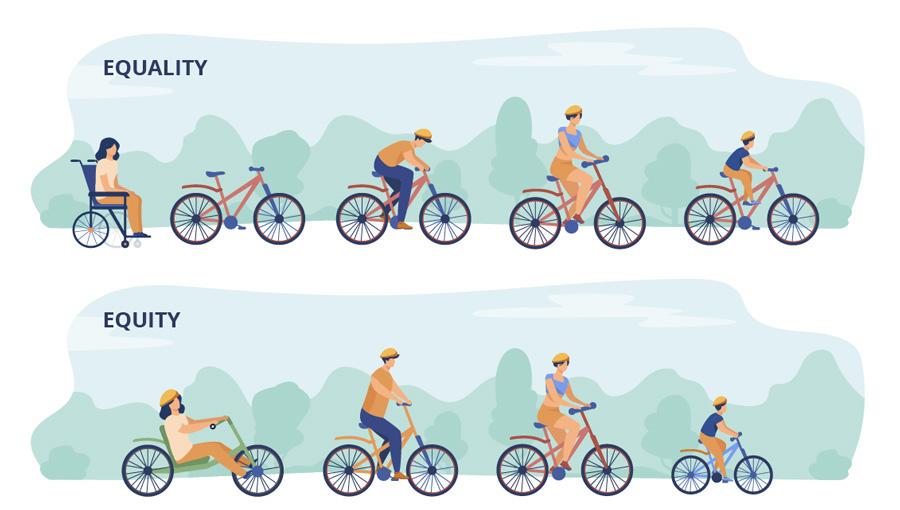
Such tools are in a process of continuous improvement through use and feedback. Pegasus Health seeks to further develop and apply equity tools to support its equity and population health approach.
Co-design approach putting people and whānau at the centre of service design and improvement, developed by the Te Tiriti & Equity Group compromised of the Canterbury Clinical Network (CCN), Te Kāhui o Papaki Kā Tai and Manawhenua ki Waitaha.
Emphasis on purposefully engaging identified partners in the planning, development and review of health and well-being services.
Tool to help determine and address health priorities and to progress equitable health outcomes for Pegasus Health initiatives.
Adapts the 'Plan-Do-Check-Adjust' model for use in primary health care organisations: to design new or improving projects or services; use data to understand root causes and prioritise iniatives; and implement change using continuous improvement.
To prioritise initiatives within the scope of the Equity & Population Health Strategy, prioritisation principles are applied to initiatives most likely to have the greated impact on health equity within the available resource.
Tool to evaluate Pegasus Health programmes and services based on equity principles, with a focus on priority populations: Māori, Pacific peoples, CALD, Rainbow, disability, and high deprivation peoples.
The impact of our stategy will be measured using Hāmana Equity Data Dashboard, a set of health indicators to explore population-level data with an equity lens.
By prioritising communities and population groups generally underserved by the health system, this data dashboard assists in decisionmaking, targeting approaches and monitoring health equity.
TANGATA
Monitoring Pegasus Health Equity Measures is a key role of the Pegasus Health Advisory Boards. Through this role, the Advisory Boards are able to hold the organisation to account to achieve health equity.
An implementation plan based on the Call-to-Action has been developed, to be monitored and reported on, to ensure Pegasus Health's commitment to equity and population health.
The Pegasus Health Equity & Population Health Steering Group will monitor the implementation of the Equity & Population Health Strategy.
Routine reporting on the implementation of the strategy will go to the:
» Pegasus Health Strategic Leadership Team
» Pegasus Health (Charitable) Ltd Board
» Two Pegasus Health Advisory Boards (CQAB and PHAB)
» Canterbury Reference Groups (TKOP, PRG and CHAG).
The Pegasus Health Equity & Population Health Strategy | Kia atawhai ki te tangata 2022-2030 will help keep equity at the heart of all that we do to keep Waitaha Canterbury the best place to receive and provide health care.

"At Pegasus Health, we aim to put equity at the heart of all we do. The current inequities in health outcomes are unacceptable. Addressing these inequities is our highest priority."
Mark Liddle Manukura | Chief Executive Officer